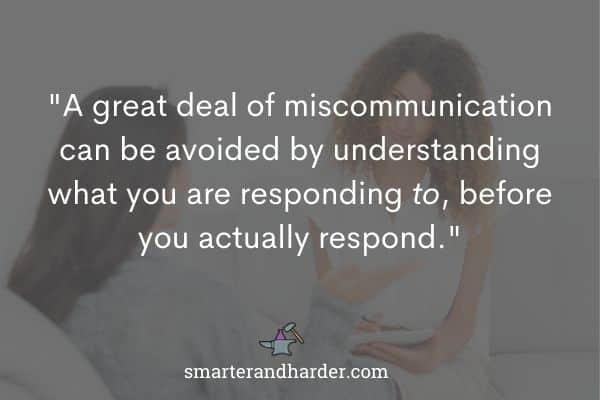It’s no secret that good listening is one of the most valuable (and underdeveloped) tools in human relationships. Of course, we all know it’s inappropriate to suck up all the air in the room and that there’s more to listening than “waiting for your turn to speak.” But beyond that, this issue rarely gets much of a closer look. So, what are the things great listeners actually do?
The first, and most important thing to understand here, is that good listening is not just a switch we can flip from “off” to “on.”
No one is born a great listener. We all want to stand out, matter, and be heard. Unfortunately, this craving can sometimes conflict with our ability to offer the same to others. But being a giver and taker in this regard is not just a simple choice. It is a skill we need to learn.
And with that, it gets a lot easier. Once we see that this is more than something we merely “do” or “don’t do,” we can start practicing the skills we need to have healthier interactions that work better for everyone, including ourselves.
Why Is It Important to Be a Great Listener?
This question is a little like asking why treating people well matters. That’s how fundamental a building block good listening is to healthy relationships. Yet it is commonly reduced to little more than a tired platitude, if not entirely ignored.
Listening well is one of the most basic kindnesses you can offer someone else and an essential way of building your connection with others. It is equally vital to relationships as food, water, and shelter are to the body.
From your closest loved ones to “HELLO, my name is: Brad” at that work conference you went to last spring, everyone wants to feel heard and valued.
Actively listening to someone is a way of showing respect. Allowing others to feel respected and appreciated in this way is an excellent way of building connection. It makes them feel closer to you, and it gives them joy to talk with you. They can feel that love right away. Yes, even Brad.
And the thing that all great listeners know is that it’s not just a one-way street. It isn’t only about throwing yourself on the grenade so that others can feel heard. People notice when you’re sincerely listening to them, and they’re eager to repay that kindness. Not just that, but they’ll pay it forward, too.
A conversation can be a joyous exploration between two people or a “cool story” arms race that leaves everyone exhausted and frustrated. You have the power to decide.
5 Ways to Practice Being a Better Listener
Resist the Urge to Over-Relate
Our first crucial listening skill has a bit of nuance to it. You may read the heading of this tip and say, “What?! But we’re supposed to relate to other people! Isn’t that what relationships are?“
To which I would say you’re right. We want to relate to other people, and it helps us become closer to each other. But that same drive can cause issues if we fail to keep an eye on it.
Here’s what I mean. Imagine someone telling you a story that reminds you of a similar story from your experience. Sharing your similar story might be a great way to connect. It shows interest in the other person’s experience and shares something personal in response.
On the other hand, if someone is trying to speak to you, and every other word they say reminds you of something about yourself, you’d do well to keep that urge in check some of the time. Over-relating makes other people feel interrupted, ignored, and like you’re just here to talk about you.
Prompt and Engage
Fortunately, relating is not the only way to be an active listener and show someone that you are fully there with them.
One thing that most listeners don’t do nearly enough, and great listeners do, is ask follow-up questions. Give others the opportunity to tell you more. Try saying things like:
- “Tell me more about that.”
- “How did that feel?”
- “Wow, it must be difficult to manage all that at once.”
- “Where do you even find that many rubber ducks on short notice??”
Rather than “taking the ball back” in the conversation right when someone reaches the end of a thought, encourage them to elaborate.
When you engage someone in this way and give them room to expand on a topic they care about, you can see their whole expression change. People light up when they connect with someone on a topic that matters to them. It is a delightful feeling that, frankly, most of us don’t get to feel nearly enough!
Allow for Natural Pauses
This strategy is another way great listeners break the “waiting for your turn to speak” pattern.

Not every molecule of air in a conversation must be full of words. Talks are usually more engaging and fulfilling when breathing room exists between thoughts.
Remember the core minimalist principle that sometimes free space is more valuable than anything you can put into it.
When you allow yourself or someone else to reach the end of a thought and don’t immediately jump in with the next thing, it gives both of you some space to think, process what has already gone between you, and speak more thoughtfully to one another.
This case is apparent when speaking with introverts or people with certain types of anxiety. They may have something to say but need a moment to decide how to say it. A brief pause from you may feel like a gift to them, an invitation to share their insight.
Learn to love that free space for its own sake.
Clarify Before Responding
Okay, pay close attention for a moment because this one is a killer.
You know that telephone game? The one where someone whispers something in your ear, and you whisper what you think you heard in the next person’s ear, and so on? Usually, after a chain of just a few people, the phrase becomes unrecognizable from what it originally was.
Everyday conversations can be similar, except we don’t notice it happening.One of the greatest breakdowns in interpersonal communication is that we frequently respond to what wethink the other person said rather than what they were trying to say. This disconnect can be a source of frustration, even anger. It is both a cause and an agitator in countless arguments.

Try this. From time to time in conversation, repeat back what you think the other person said, in your own words, before responding. Don’t reply; just repeat. As often as not, the other person will want to correct you somewhat, or at least clarify. That is okay; in fact, it’s the point. That is the technique working.
You can prevent a great deal of miscommunication by making sure you understand what you heard before responding to it.
Great listeners understand the importance of clarifying. They use it to defuse tension, show respect, and improve their relationships.
Think About the Type of Response You Give
When you do respond in conversation, it is critical to consider how you respond. First, try to understand where the person is coming from. The good news is that if you’re already using some of the other strategies on this list, this should go naturally.
Not all conversations are the same. If you can read the context to understand better what someone is looking for, you will be able to act in a way that makes them feel heard and builds your connection with them.
Here’s an example most of us will recognize: sometimes, a person is coming to you for advice. But, usually, they aren’t.
If someone is giving clear signals that they want advice (“I’m not sure how to handle this,” “what would you do?” etc.), feel free to offer suggestions. But other times, they may be looking for validation, loving and supportive words, someone to laugh with, an ear that will let them vent their frustration, or who knows what else.
Your opinions and responses will always be your own, but things will go much smoother when you can match the way you’re responding with the type of conversation the other person is trying to have with you.
If you can meet people on the level that they are approaching you, you’re well on your way to being a great listener and having conversations that leave everyone feeling more peaceful, satisfied, and fulfilled.


Great thoughts and ideas to ponder.
In teaching, we use something called ‘wait time’, kind of like what you’re saying in #3. Some people need time to process before they can respond.
I also agree with your point of clarifying the other person’s point before responding. This does tend to minimize misunderstandings.
Thanks! I think listening is (maybe obviously) much more about what you don’t say than what you do, and it’s a great thing to make sure to give other people enough room to feel validated.
Hi Sam,
Welcome to YAW. As a retired mental health counselor I really liked reading what you had to say. So much of this your information is what we learn when we begin the program to learn to be a counselor. Of course, it is basic listening skills, but you would be amazed at how many people need to be taught these skills. Thanks for sharing.
Thanks a bunch, Karen, glad you stopped by for a visit! Coming from a mental health counselor, I’m going to put this feedback up on a very high shelf 🙂
I do find it fascinating how basic these skills can seem, while at the same time being so foreign to many of us. Some of them I’ve definitely needed to learn along the way, and I’m so glad I have!